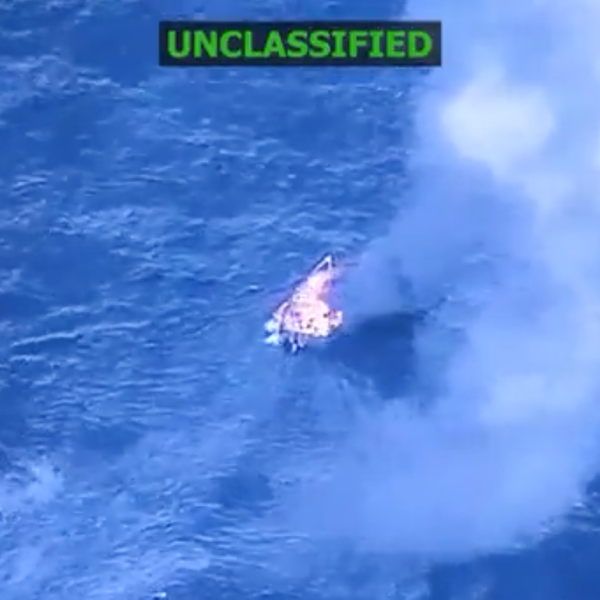
This image obtained through a FOIA request by the Center for Biological Diversity shows a dead wolf or coyote near a poison sign in New Mexico.
Trump Administration Reauthorizes 'Cyanide Bombs' to Kill US Wildlife
Conservation groups say the devices are indiscriminate killers that should be banned
Brushing off overwhelming public opposition, the Trump administration this week re-approved the use of so-called "cyanide bombs" to kill wild animals on public lands.
Known officially as M-44s, the devices "can't be used safely by anyone, anywhere," said Collette Adkins, carnivore conservation director at the Center for Biological Diversity, noting that they claim the lives of target animals like coyotes as well as non-target animals including foxes, bears, and family pets.
The announcement was posted in the Federal Register, authorizing their use on "an interim basis--until a final decision can be made in 2021," as Newsweek reported. It authorizes their use by Wildlife Services, a program of the U.S. Department of Agriculture, and by state agencies in South Dakota, Montana, Wyoming, New Mexico, and Texas, said the Center for Biological Diversity.
Wildlife Services--which has been in the crosshairs of animal welfare and conservation groups--says its mission is "to resolve wildlife conflicts to allow people and wildlife to coexist." However, critics like the Humane Society say (pdf) it "has shown a preference for lethal methods in resolving conflicts" and has been "exterminating wildlife as a government subsidy for private ranchers and other special interests, using inhumane and ineffective methods, while the U.S. taxpayers foot a large share of the bill."
Agence France-Presse reported:
The devices, known as M-44s, which are implanted in the ground and resemble lawn sprinklers, use a spring-loaded ejector to release sodium cyanide when an animal tugs on its baited capsule holder.
The government halted the use of the devices last year after one of them was responsible for injuring a boy and killing his dog in Idaho.
BBC News added:
But the EPA has decided they are still safe for use, after support from rancher groups and "stakeholders" including farmers groups.
It said that the cyanide bombs stopped predators from killing livestock and that a ban would result in farmers losing money.
The Center for Biological Diversity, in a tweet, called M-44s "horrific death traps."
When the EPA earlier this year proposed their reinstatement, the Center for Biological Diversity and Western Environmental Law Center analyzed a batch of over 22,000 public comments.
Public sentiment was clear, said the groups, as 99.9 percent of people supported a ban on the cyanide bombs.
The conservation groups also pointed to Wildlife Services' own data showing that out of the nearly 6,600 animals it killed in 2018, over 200 were non-target animals--a death toll they say is likely an under-count.
"EPA is blatantly ignoring its fundamental duty to protect the public, our pets, and native wildlife from the cruel, lethal impacts of cyanide bombs lurking on our public lands," said Kelly Nokes, a wildlife attorney with the Western Environmental Law Center.
The EPA did add restrictions--including increasing the amount of space between a public roadway and the devices, and the distance between warning signs and the cyanide bombs--but those changes did little to assuage conservation groups' concerns.
"Tightening up use restrictions is turning a blind eye to the reality of M-44s," said Brooks Fahy, executive director of Predator Defense.
"In my 25 years working with M-44 victims I've learned that Wildlife Services' agents frequently do not follow the use restrictions. And warning signs will not prevent more dogs, wild animals, and potentially children from being killed," he continued. "They cannot read them."
"M-44s are a safety menace," said Fahy, "and must be banned."
An Urgent Message From Our Co-Founder
Dear Common Dreams reader, The U.S. is on a fast track to authoritarianism like nothing I've ever seen. Meanwhile, corporate news outlets are utterly capitulating to Trump, twisting their coverage to avoid drawing his ire while lining up to stuff cash in his pockets. That's why I believe that Common Dreams is doing the best and most consequential reporting that we've ever done. Our small but mighty team is a progressive reporting powerhouse, covering the news every day that the corporate media never will. Our mission has always been simple: To inform. To inspire. And to ignite change for the common good. Now here's the key piece that I want all our readers to understand: None of this would be possible without your financial support. That's not just some fundraising cliche. It's the absolute and literal truth. We don't accept corporate advertising and never will. We don't have a paywall because we don't think people should be blocked from critical news based on their ability to pay. Everything we do is funded by the donations of readers like you. Will you donate now to help power the nonprofit, independent reporting of Common Dreams? Thank you for being a vital member of our community. Together, we can keep independent journalism alive when it’s needed most. - Craig Brown, Co-founder |
Brushing off overwhelming public opposition, the Trump administration this week re-approved the use of so-called "cyanide bombs" to kill wild animals on public lands.
Known officially as M-44s, the devices "can't be used safely by anyone, anywhere," said Collette Adkins, carnivore conservation director at the Center for Biological Diversity, noting that they claim the lives of target animals like coyotes as well as non-target animals including foxes, bears, and family pets.
The announcement was posted in the Federal Register, authorizing their use on "an interim basis--until a final decision can be made in 2021," as Newsweek reported. It authorizes their use by Wildlife Services, a program of the U.S. Department of Agriculture, and by state agencies in South Dakota, Montana, Wyoming, New Mexico, and Texas, said the Center for Biological Diversity.
Wildlife Services--which has been in the crosshairs of animal welfare and conservation groups--says its mission is "to resolve wildlife conflicts to allow people and wildlife to coexist." However, critics like the Humane Society say (pdf) it "has shown a preference for lethal methods in resolving conflicts" and has been "exterminating wildlife as a government subsidy for private ranchers and other special interests, using inhumane and ineffective methods, while the U.S. taxpayers foot a large share of the bill."
Agence France-Presse reported:
The devices, known as M-44s, which are implanted in the ground and resemble lawn sprinklers, use a spring-loaded ejector to release sodium cyanide when an animal tugs on its baited capsule holder.
The government halted the use of the devices last year after one of them was responsible for injuring a boy and killing his dog in Idaho.
BBC News added:
But the EPA has decided they are still safe for use, after support from rancher groups and "stakeholders" including farmers groups.
It said that the cyanide bombs stopped predators from killing livestock and that a ban would result in farmers losing money.
The Center for Biological Diversity, in a tweet, called M-44s "horrific death traps."
When the EPA earlier this year proposed their reinstatement, the Center for Biological Diversity and Western Environmental Law Center analyzed a batch of over 22,000 public comments.
Public sentiment was clear, said the groups, as 99.9 percent of people supported a ban on the cyanide bombs.
The conservation groups also pointed to Wildlife Services' own data showing that out of the nearly 6,600 animals it killed in 2018, over 200 were non-target animals--a death toll they say is likely an under-count.
"EPA is blatantly ignoring its fundamental duty to protect the public, our pets, and native wildlife from the cruel, lethal impacts of cyanide bombs lurking on our public lands," said Kelly Nokes, a wildlife attorney with the Western Environmental Law Center.
The EPA did add restrictions--including increasing the amount of space between a public roadway and the devices, and the distance between warning signs and the cyanide bombs--but those changes did little to assuage conservation groups' concerns.
"Tightening up use restrictions is turning a blind eye to the reality of M-44s," said Brooks Fahy, executive director of Predator Defense.
"In my 25 years working with M-44 victims I've learned that Wildlife Services' agents frequently do not follow the use restrictions. And warning signs will not prevent more dogs, wild animals, and potentially children from being killed," he continued. "They cannot read them."
"M-44s are a safety menace," said Fahy, "and must be banned."
Brushing off overwhelming public opposition, the Trump administration this week re-approved the use of so-called "cyanide bombs" to kill wild animals on public lands.
Known officially as M-44s, the devices "can't be used safely by anyone, anywhere," said Collette Adkins, carnivore conservation director at the Center for Biological Diversity, noting that they claim the lives of target animals like coyotes as well as non-target animals including foxes, bears, and family pets.
The announcement was posted in the Federal Register, authorizing their use on "an interim basis--until a final decision can be made in 2021," as Newsweek reported. It authorizes their use by Wildlife Services, a program of the U.S. Department of Agriculture, and by state agencies in South Dakota, Montana, Wyoming, New Mexico, and Texas, said the Center for Biological Diversity.
Wildlife Services--which has been in the crosshairs of animal welfare and conservation groups--says its mission is "to resolve wildlife conflicts to allow people and wildlife to coexist." However, critics like the Humane Society say (pdf) it "has shown a preference for lethal methods in resolving conflicts" and has been "exterminating wildlife as a government subsidy for private ranchers and other special interests, using inhumane and ineffective methods, while the U.S. taxpayers foot a large share of the bill."
Agence France-Presse reported:
The devices, known as M-44s, which are implanted in the ground and resemble lawn sprinklers, use a spring-loaded ejector to release sodium cyanide when an animal tugs on its baited capsule holder.
The government halted the use of the devices last year after one of them was responsible for injuring a boy and killing his dog in Idaho.
BBC News added:
But the EPA has decided they are still safe for use, after support from rancher groups and "stakeholders" including farmers groups.
It said that the cyanide bombs stopped predators from killing livestock and that a ban would result in farmers losing money.
The Center for Biological Diversity, in a tweet, called M-44s "horrific death traps."
When the EPA earlier this year proposed their reinstatement, the Center for Biological Diversity and Western Environmental Law Center analyzed a batch of over 22,000 public comments.
Public sentiment was clear, said the groups, as 99.9 percent of people supported a ban on the cyanide bombs.
The conservation groups also pointed to Wildlife Services' own data showing that out of the nearly 6,600 animals it killed in 2018, over 200 were non-target animals--a death toll they say is likely an under-count.
"EPA is blatantly ignoring its fundamental duty to protect the public, our pets, and native wildlife from the cruel, lethal impacts of cyanide bombs lurking on our public lands," said Kelly Nokes, a wildlife attorney with the Western Environmental Law Center.
The EPA did add restrictions--including increasing the amount of space between a public roadway and the devices, and the distance between warning signs and the cyanide bombs--but those changes did little to assuage conservation groups' concerns.
"Tightening up use restrictions is turning a blind eye to the reality of M-44s," said Brooks Fahy, executive director of Predator Defense.
"In my 25 years working with M-44 victims I've learned that Wildlife Services' agents frequently do not follow the use restrictions. And warning signs will not prevent more dogs, wild animals, and potentially children from being killed," he continued. "They cannot read them."
"M-44s are a safety menace," said Fahy, "and must be banned."

